Visdum + NetSuite: Real-Time, Payment-Linked Commissions for NetSuite Teams

If you’re responsible for managing NetSuite in your organization, this probably sounds familiar: the deal is closed, the invoice is issued, but the real work is only just beginning.
Finance teams chase down payment status. RevOps works overtime reconciling spreadsheets. Sales Ops fields constant questions from reps about what they’ve earned. Accounting juggles manual clawbacks when payments fall through or credit notes are applied.
It’s a painful, time-consuming dance; and for companies with large sales teams and complex compensation plans, the stakes are high.
Overpay commissions before cash is collected → cash flow suffers, clawback disputes arise.
Underpay or delay payouts → sales morale drops.
NetSuite is an ideal system of record for invoices and payments. But managing commissions tied to payment conditions often means custom scripts, manual reconciliation, and endless cross-functional coordination.
That’s where Visdum comes in. Our integration with NetSuite helps you automate, align, and de-risk sales commission management at scale.
Why NetSuite alone isn’t enough for commission accuracy?
NetSuite is a powerful financial backbone, but when it comes to complex commission logic, it hits limits fast.
Here's where things tend to break down.
- Enforce complex payment conditions (e.g., pay after 50% of invoice collected, proportional payouts on partial payments)
- Apply clawbacks automatically when credit notes or bad debts are recorded
- Provide real-time sales commission visibility for Finance, RevOps, and Sales Ops — all from a single source of truth
What does this look like in practice?
It means teams maintaining fragile SuiteScripts. Finance spending days reconciling reports and spreadsheets. Constant meetings to align on numbers. And an ever-present risk of errors that undermine both trust and financial integrity.
How does Visdum-NetSuite integration help you?
Visdum’s native integration bridges the gap bringing automation, precision, and visibility to your entire commission process, without custom scripts or manual workarounds.
Commissions that mirror cash flow
Visdum syncs customer payments, credit notes, and bad debt status directly from NetSuite. Commissions are only calculated and released when your defined payment conditions are met; no exceptions, no workarounds.
Complex payout logic, no code required
Whether your plan requires:
- Payouts only after X% of invoice value is collected
- Proportional payouts as payments are received
- Automatic clawbacks when a credit note or bad debt hits NetSuite
Visdum enforces the rules, precisely as designed, without custom code.
Trust-Building Transparency for All Teams
Every commission payout in Visdum is backed by a clear, verifiable trail tied to NetSuite records. Finance can reconcile in minutes. Auditors can review with confidence. Sales reps see what they’ve earned and why.
With Visdum + NetSuite, your organization gains:
- Stronger cash flow discipline — Commissions align with collections, not bookings.
- Faster, cleaner reconciliation — Finance and Accounting close books faster, with fewer errors.
- Sales team confidence — Reps trust the numbers because they’re tied to real customer payments.
- Reduced operational overhead — No more manual intervention to enforce plan rules.
How does the Visdum-NetSuite integration work?
Getting started is fast and non-technical. Here's how you can connect Visdum with NetSuite and run your first payout in under an hour.
1. Connect Your NetSuite Account: Securely authenticate and link your NetSuite account with Visdum in a few clicks. Once connected your NetSuite account is securely integrated and ready to sync billing and invoice data
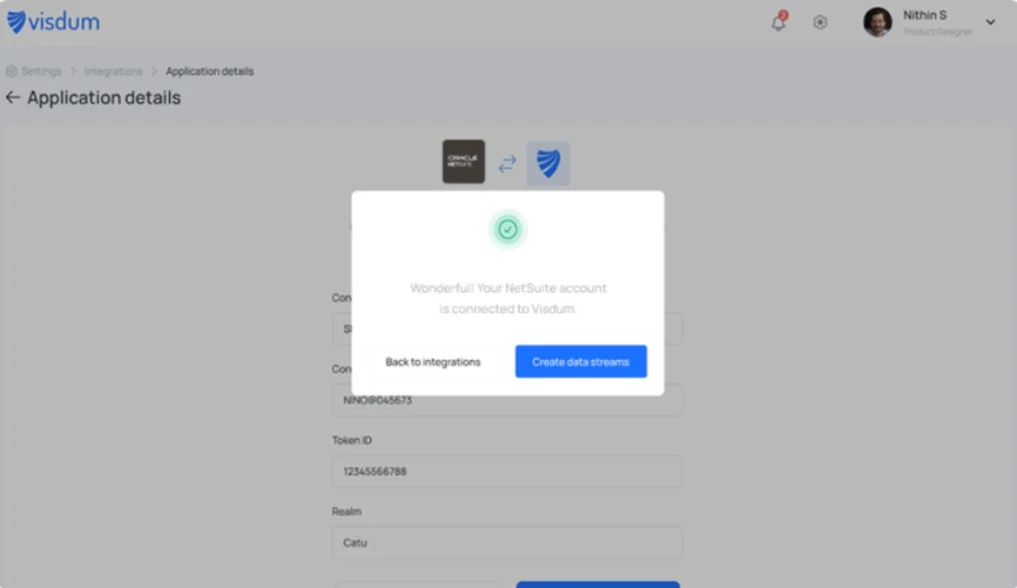
2. Create a New Data Stream: Give your stream a name that reflects its purpose such as Invoice stream or User Stream. Connect NetSuite as the data source and choose whether the stream should process Earnings or Payouts. This ensures commission data is pulled and categorized correctly within Visdum.
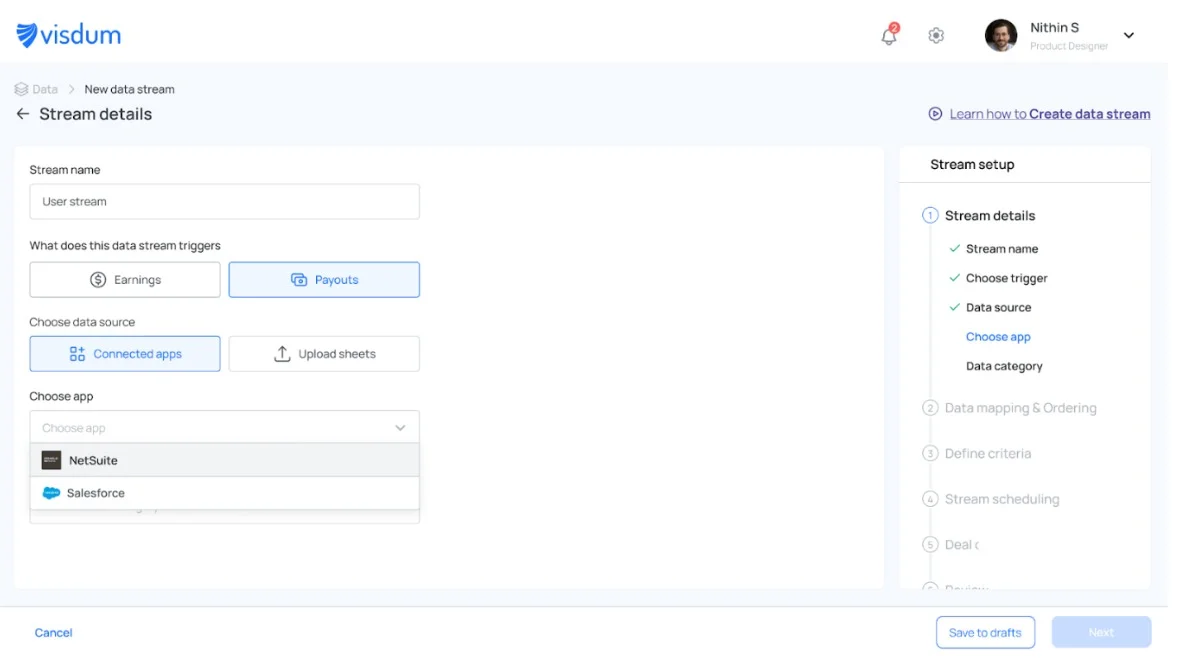
3. Map your Data Fields: Map NetSuite fields like payment ID, employee ID, amount paid and transaction name to corresponding Visdum fields. This ensures accurate and consistent commission data flows.
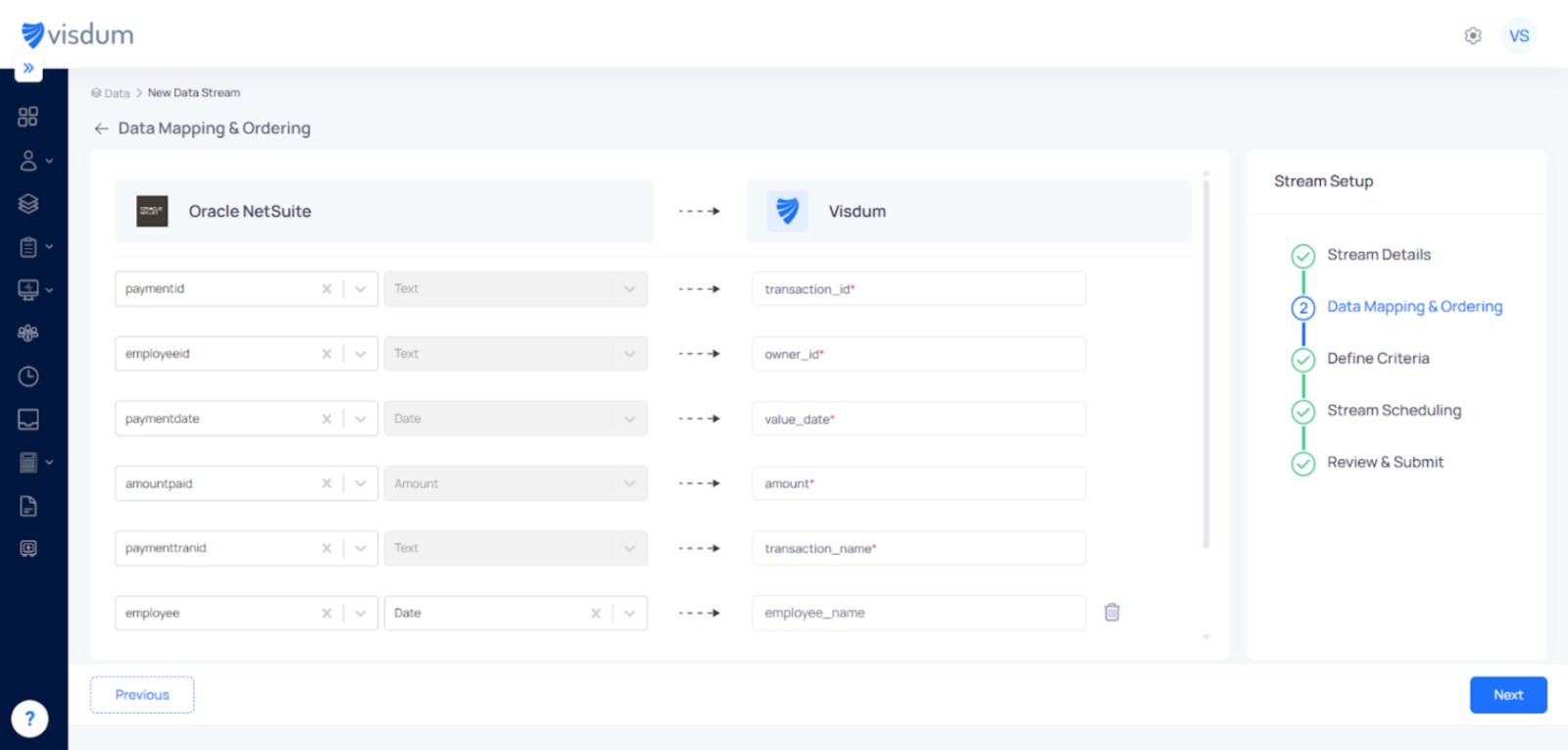
4. Define Criteria: Add filters to control which records are included in the data stream. For example, you can specify that only transactions after a certain date or with certain conditions are synced.
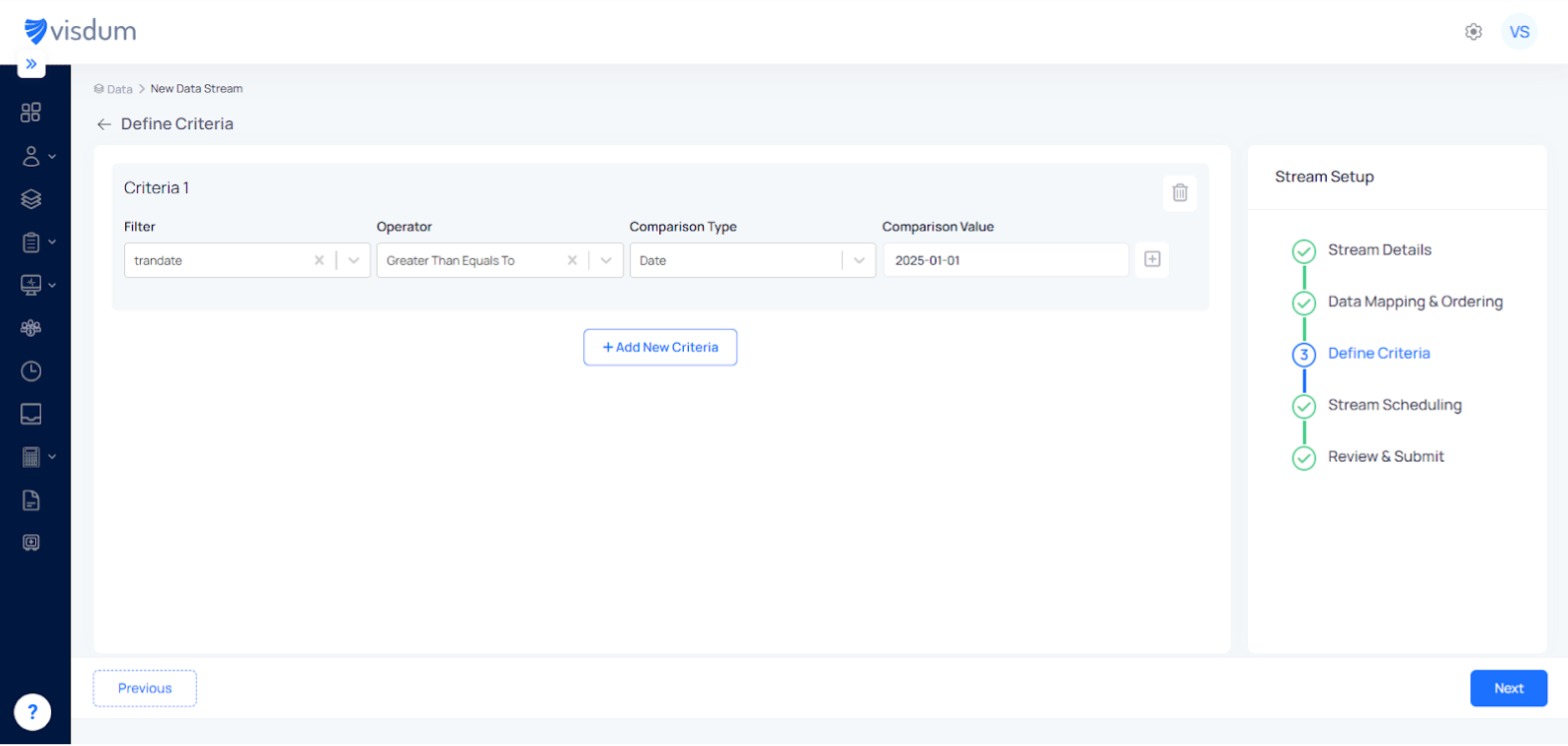
5. Schedule Data Syncs: Choose how often data should sync by selecting days and times that fit your workflow. Whether daily or weekly, Visdum ensures your data stays updated automatically.
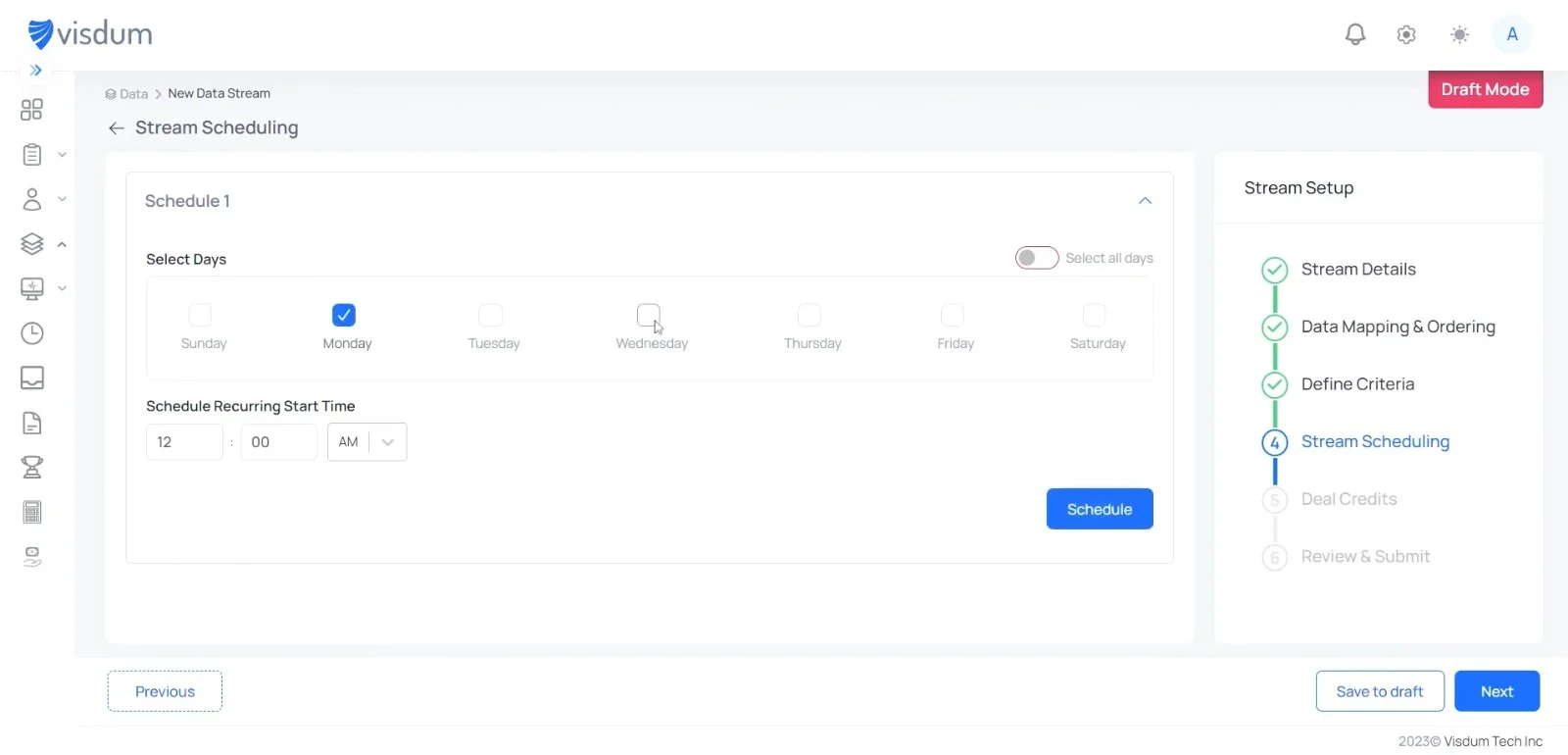
6. Review & Submit: Check all stream details, mapped fields, and criteria before activating. Test the connection, then submit to finalize your setup and start syncing live data.
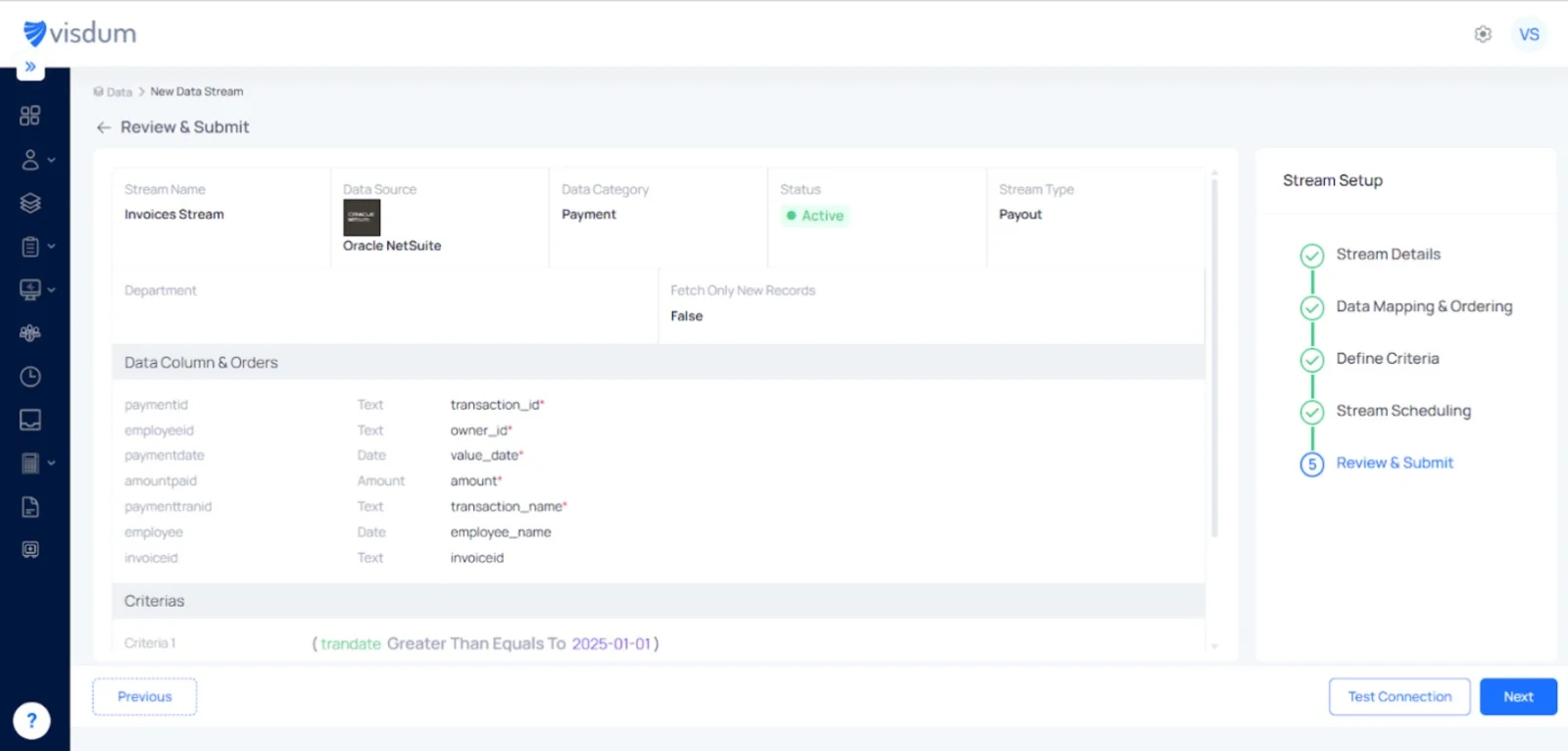
Kudos! Your NetSuite account is now integrated with Visdum, keeping your invoice and billing data in sync and ensuring that commissions are always calculated accurately and released automatically.
Real-world example: NetSuite-linked commission logic, executed right
Here’s what this looks like in practice; a simple scenario that shows how Visdum mirrors your payment flow, right down to the last clawback.
Let’s say a rep closes a $100,000 deal. NetSuite generates the invoice, but the customer pays in parts:
- $60,000 after 30 days
- $30,000 after another 15 days
- $10,000 is refunded via a credit note
Here’s what Visdum does, automatically:
- Releases 60% of the commission when the first payment lands
- Releases 30% after the next payment
- Claws back the final 10% due to the credit note
No manual tracking. No spreadsheet recalculations. Just logic that mirrors your real-world cash flow.
Bonus: Go beyond calculation with approvals, adjustments & compliance
Once the math is done, Visdum adds the missing layers like built-in approvals, plan adjustments, and ASC 606 compliance, all backed by audit-ready logs.
- Approval workflows: Route statements to managers, payees, or leadership. Each person sees only what they need to act on.
- Adjustments module: Handle exceptions like credit notes, one-off bonuses, or clawbacks with clear audit trails.
- Version history: Every plan, edit, or change is tracked. No more “Who changed this rule?” chaos.
- ASC 606 compliance, baked in: If your business capitalizes commissions under ASC 606, Visdum takes care of the heavy lifting:
- Auto-calculates amortization schedules
- Links payouts directly to billing and payment events
- Generates audit-ready reports on demand
Instead of juggling compliance tools and spreadsheets, Finance can stay audit-ready without extra effort. Visdum makes sure every payout stands up to scrutiny.
What does this mean for NetSuite users?
This integration isn't just about automation it's about alignment.
Here's what your Finance, Sales, and RevOps teams gain from it, every payout cycle. With Visdum, you’re not just automating calculations. You’re building a commission ecosystem:
- Sales gets visibility and speed
- Finance gets auditability and compliance
- RevOps gets flexibility to model even the messiest rules
Most importantly, everyone is on the same page—no guesswork, no emails, no frustration.
No more fire drills. Just clean, confident payouts.
Managing commissions in NetSuite doesn't have to mean juggling scripts, spreadsheets, and manual clean-up every cycle. With Visdum, you can :
- Align payouts with real collections.
- Enforce complex rules without custom code
- Give every stakeholder full visibility, down to the penny
- Stay compliant with ASC 606, without the spreadsheet gymnastics
This isn’t just automation—it’s a smarter, more transparent way to manage compensation at scale.
Let Visdum turn your comp plan into a system you can trust. One that’s accurate, auditable, and built for how your team actually works.
.webp)
FAQs
Q1. What is NetSuite?
NetSuite is Oracle’s cloud-based ERP that manages finance, accounting, invoicing, payments and CRM in one system. Its powerful but complex commission plans often need extra automation.
Q2. Why is managing commissions in NetSuite difficult?
NetSuite handles the basics, but when plans get complex with tiers, accelerators, splits and clawbacks - it falls short. Visdum helps you to automate even the most complex plans easily.
Q3. What is ASC 606?
ASC 606 is an accounting standard that requires businesses to recognize revenue and related costs like commissions over the duration of a contract. It ensures consistency and accuracy in financial reporting.
Q4. Does Visdum support ASC 606 compliance?
Yes, Visdum helps with ASC 606 compliance by automating commission deferrals, letting you set rules for which commissions to include and capitalizing them over the contract period with audit-ready reports.
Q5. What are the key benefits of Visdum + NetSuite integration?
Visdum + NetSuite automates commission calculations, ensures compliance, and supports complex plans with accuracy. Teams get transparent payouts, fewer disputes, and smooth payroll execution.

.webp)
.webp)
.webp)

